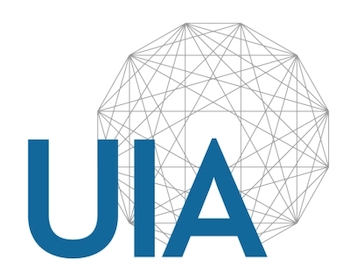Partnering for Sustainability

Sustainability is a challenge facing everyone, including the nonprofit world. Even organizations which are not directly involved in tackling environmental issues will be required to be part of the solution in the near future. Partnerships offer a means of effecting meaningful changes which could not be achieved on one's own.
On 26th February, UIA cooperated with Legacy17 to host a workshop at the 2-day World Resources Forum in Antwerp. This conference gathered together 700 participants to discuss the idea of circular economy. UIA’s workshop revolved around asking the question whether there really is such a thing as waste, which led to a fascinating panel discussion under the moderation of Marilyn Mehlmann, UIA Vice-President, and Co-founder of Legacy17. The speakers were Dianne Dillon-Ridgley, board member for the Centre for International Environmental Law, and UIA Council Member, Brigitte Dero, CEO for Vinyl+ and the European Council of Vinyl Manufacturers, Pär Lashans, head of sustainable development and innovation at Ragn-Sells, and Sergio Fernandez Casado, Sustainability Improvement Manager for Knauf Spain.
 The discussion quickly led to the conclusion that in an ideal world, the term “waste” would be redundant. In a truly 100% circular economy, waste will be seen as a resource for another production process. Two components will be essential to shift things in this direction, namely: systemic innovation and innovative partnerships. No single organisation or sector has the knowledge or resources to “go it alone.” Leaders from all sectors of society agree that solving sustainability challenges will require unparalleled cooperation. In 2015 the United Nations Global Compact conducted a survey in partnership with MIT Sloan Management Review, and The Boston Consulting Group. The results showed that 90% of executives believe that collaboration is important to address the challenge of sustainability. So how can partnerships lead to a more sustainable world?
The discussion quickly led to the conclusion that in an ideal world, the term “waste” would be redundant. In a truly 100% circular economy, waste will be seen as a resource for another production process. Two components will be essential to shift things in this direction, namely: systemic innovation and innovative partnerships. No single organisation or sector has the knowledge or resources to “go it alone.” Leaders from all sectors of society agree that solving sustainability challenges will require unparalleled cooperation. In 2015 the United Nations Global Compact conducted a survey in partnership with MIT Sloan Management Review, and The Boston Consulting Group. The results showed that 90% of executives believe that collaboration is important to address the challenge of sustainability. So how can partnerships lead to a more sustainable world?
Both in policy and academic discussions, partnerships can provide the solution to deadlocked negotiations, ineffective policies, and corruption. Multi-stakeholder partnerships which bring together partners from civil society, business, and governments are an innovative way to address deficits of closed debates. Innovation is the product of thinking outside the box, and there is no better way to break free from insular procedure than to have the status quo challenged by parties with different experiences, strategic visions, and aspirations. All those involved can learn best practices from each other, highlight inefficiencies and improve them, discover shared skillsets.
Multi-sector partnerships draw on diverse competencies of partners from many sectors to tackle problems that individual organisations, or even whole sectors, cannot solve or cannot solve as well, working independently. Due to their potential to combine resources, skills and knowledge from a wide range of stakeholders to address the challenges of creating a sustainable planet, these cross-boundary partnerships have sometimes been called the collaboration paradigm of the 21st century.
That civil society should be involved in these partnerships to create a more sustainable future seems evident. Where governments and businesses do not always have the best record where sustainable aspirations are concerned, environmental activism in civil society has a long history of challenging orthodox views on environmental policies. Civil society is also frequently a source of grassroots, and predominantly social, innovative activity contributing to a ferment of diverse, often hybridising, sustainable energy activities. Additionally, NGOs have often taken up the roles which some governments are no longer able to fulfil due to shrinking resources or weakened social mandates.
Collaboration can also be a vital strategy to attract the necessary funding to launch and successfully accomplish projects. A partnership of organisations is able to access different financial sources which would be unattainable to each of the members individually. This factor is particularly relevant when considering the reliability of funding sources. Having plural financial streams can prevent a calamity by protecting a project from depending solely on only one type of funding. It is important to note the rather sobering fact that research shows that while generally all parties mutually benefit from collaboration, historically associations have often shouldered the heavier financial burden while ceding more for the decision-making to partners from the corporate world. Empowered civil society collaboration is not only a more appropriate model for pursuing sustainable development, it is also more effective in achieving not just organisation goals, but developmental impact. Fortunately, with the rise of awareness of environmental issues, the acceptance that this is the right path to choose is growing.
In general, most successful partnerships are founded on shared goals. Within the enormous world that is civil society, it can be a significant challenge to find the right parties with which to collaborate. The United Nations’ Sustainable Development Goals (UN SDGs) serve to unite organisations under seventeen umbrellas. This is an incredibly useful tool in facilitating potential partnerships by determining which other associations share similar goals. To this end the Union of International Associations has reworked its Yearbook of International Organisations database to include categorisation according to UN SDGs. This not only allows one to track numbers on how many organisations are working on each of the seventeen goals, but also makes it possible for an organisation hoping to collaborate, to search for partners within UIA’s database of over 38,000 active international associations directly by selecting one or more goals.
The number of people denying that climate change is the greatest global challenge of our time is dwindling. For significant progress to be achieved in the fight for a more sustainable future, large-scale projects are required. Partnerships are one of the best chances the world has to achieve major lasting change.
Author: Amelia Folkema is the Communications Officer for the Union of International Associations (UIA). She is also involved in planning the upcoming UIA Associations Round Tables in Pattaya on 19 & 20th September, and in Brussels on 4th November.

Other Articles
About Us
Supported by the Union of International Associations (UIA), the International Association of Professional Congress Organisers (IAPCO) and the Interel Group, the global public affairs and association management consultancy, Headquarters Magazines serve the needs of international associations organising worldwide congresses.














